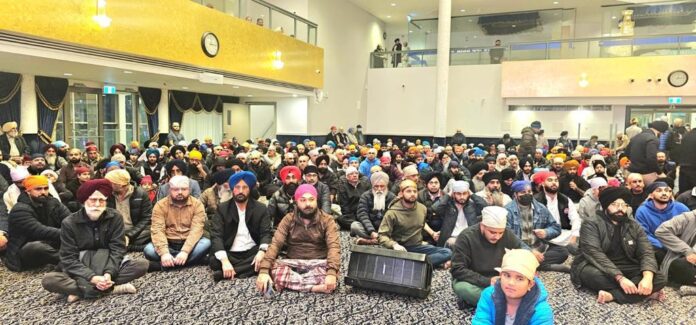By Zile Singh
New Year’s Day serves as a moment for reflection on the events of the past year and the anticipation of a hopeful and prosperous atmosphere in the year ahead. The global celebration of the new year transcends faiths and nationalities, each community bringing its unique traditions to mark the occasion. In Sikhism, the new year is not only a family affair but also a communal celebration. This year’s festivities on the new year unfolded in two parts at 8000 Ross Street, Khalsa Diwan Society, Vancouver, British Columbia, along Khalsa Diwan Road.
The inaugural segment featured the singing of hymns from Sri Guru Granth Sahib, continuing until the stroke of midnight on December 31st. The second part unfolded from the early morning hours into the late night of January 1st. A continuous recitation of Gurbani, uninterrupted langar service, and a ceaseless line of devotees offering prayers to the Eternal Sikh Guru, Guru Granth Sahib, marked both occasions.
The jubilant atmosphere was not confined to Sikhs alone; men, women, and children from diverse backgrounds, adorned in colorful attire, joined the festivities. Mr. Kuldip Singh Thandi, President of KDS, expressed gratitude to the Executive Committee members and volunteers for their dedicated efforts in ensuring the success of these joyous celebrations.
Sikhism, initially a reformist and a Bhakti (Bhagati) movement, has emerged into a political, social, economic and a religious platform at the world level. Ever since, it has remained a vehicle for change, equality, justice, and the welfare of all. Sikhism has a strong belief in the theory of actions (kirat karo), remembering God (naam japo), help the needy (vand chako), and welfare of all (sarbat da bhala).
Gurbani says that miseries are the results of our actions. Nanak, the first Guru, preached to lift ourselves in God’s Name to the Dasham Dwaar which is in the center of our head. It is a stage or a moment in time when one can realize one’s defilements and miseries. It is an introspection.
Today there is an atmosphere of fear, frivolity, immaturity, unaccountability, and uncertainty. Guru Nanak gave a message to change for the better when there was a comparable situation more than 500 years before. There was fog all around in political, social, economic, and religious fields. He came as a light to disperse that fog.
A Sikh scholar once told me that he was ‘proud’ of their charity and generosity globally, but he was ‘unsatisfied’ with the way the Sikhs are understanding the ground reality. It is like ‘standing on two stools.’ Certainly, between two stools, one comes to the ground. Therefore, it is time to stop tilting left and start upward on the right path. That is what ‘multiculturalism’ requires.
Why it is necessary to change? Because “They must often change who would be constant in happiness and to improve is to change; to be perfect is to change often.” Time is also changing on the scale of seconds, minutes, hours, days, weeks, months, years, and centuries. Time wishes us to review our religious, political, and ethical opinions and behaviors. Change for the better gives momentum to our growth. Change is the only constant. Every second there is a change in nature. All that can be perceived through our five senses, no matter how good or bad it might be, is transient. Gurbani refers to anything transient, with ending and beginning, as Kaal. Kaal, in Hindi and Punjabi languages, is equivalent to Time in English. Time and religion are correlated. Religions came into being according to the needs of the time. Religions exist in time. Time implies change and movement. On such occasions when we celebrate the New Year, let us perceive a world in which all of God’s children can live happily with malice towards none. Likes and dislikes based on class and community are anti-Sikhism. Gurbani, in one of the hymns, states, “Awwal Allah Noor Upaya, Kudrat Ke Sab Bande. Ek Noor Te Sab Jag Upajaya, Kaun Bhale Ko Mande.”
It will go against the soul of Sikhism if a Sikh discriminates his fellow human being on any ground whatsoever. The purity of the head and the heart matters. Discrimination hinders progress and celebrations.
In sum, singing is a celebration. Here is an unofficial translation of a hymn from Gurbani:
“Infinite sounds are ringing, and infinite are the players.
Infinite the singers, and infinite the melodies they sing.
Water, fire, and wind sing your glory,
And the God of death sings at your door.
Chitragupta, Shiva, Brahma, Devi – all sing your glory.





